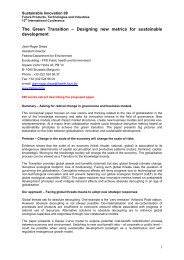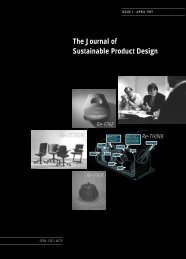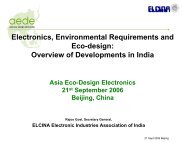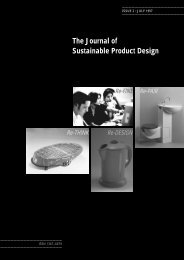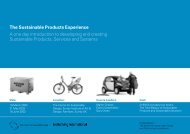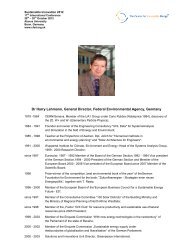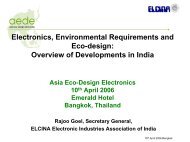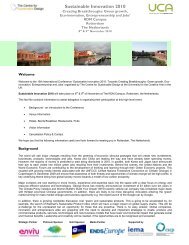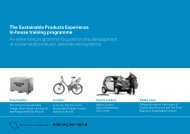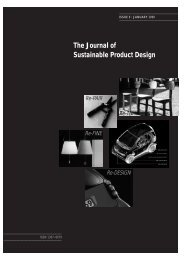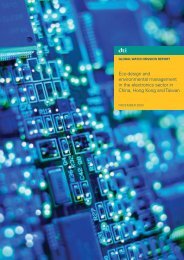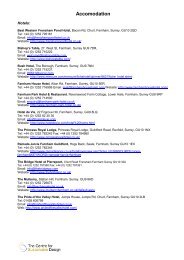Country report on the Indian electronics sector - The Centre for ...
Country report on the Indian electronics sector - The Centre for ...
Country report on the Indian electronics sector - The Centre for ...
Create successful ePaper yourself
Turn your PDF publications into a flip-book with our unique Google optimized e-Paper software.
2.0 Legislati<strong>on</strong> and industry initiatives<br />
2.1 Internati<strong>on</strong>al legislati<strong>on</strong><br />
Developments in Europe<br />
<strong>The</strong>re have been four major envir<strong>on</strong>mental legislative<br />
developments in Europe which impact <strong>the</strong> Electr<strong>on</strong>ics industry<br />
and all its stakeholders:<br />
f <strong>The</strong> Directive <strong>on</strong> <strong>the</strong> Restricti<strong>on</strong> of Certain Hazardous<br />
Substances (RoHS) [March 2003]<br />
f <strong>The</strong> Directive <strong>on</strong> Waste from Electrical & Electr<strong>on</strong>ic<br />
Equipment (WEEE) Directive [March 2003]<br />
f <strong>The</strong> proposed Directive <strong>on</strong> Eco Design and Energy Using<br />
Products (EuP) [2005]<br />
f <strong>The</strong> proposed Directive <strong>on</strong> Registrati<strong>on</strong>, Evaluati<strong>on</strong> and<br />
Authorisati<strong>on</strong> of Chemicals (REACH).<br />
<strong>The</strong> first two, RoHS and WEEE have more severe and<br />
immediate implicati<strong>on</strong>s and have been transposed into nati<strong>on</strong>al<br />
legislati<strong>on</strong> in nearly all EU member states. <strong>The</strong> o<strong>the</strong>r two relate<br />
to envir<strong>on</strong>mental issues but are not limited to <strong>the</strong> Electr<strong>on</strong>ics<br />
industry. However, in due course <strong>the</strong>y will have significant<br />
implicati<strong>on</strong>s <strong>for</strong> EEE suppliers.<br />
RoHS Directive restricts use of Certain Hazardous Substances<br />
in Electrical and Electr<strong>on</strong>ic Equipment and bans entry of goods<br />
into <strong>the</strong> EU market if <strong>the</strong>y c<strong>on</strong>tain more than <strong>the</strong> permitted<br />
levels of lead, cadmium, mercury, hexavalent chromium and<br />
both polybrominated biphenyl (PBB) and polybrominated<br />
diphenyl e<strong>the</strong>r (PBDE) flame retardants. RoHS came into <strong>for</strong>ce<br />
<strong>on</strong> 1 July 2006.<br />
<strong>The</strong> WEEE Directive <strong>on</strong> Waste Electrical and Electr<strong>on</strong>ic<br />
Equipment (2002/96/EC) aims to prevent WEEE arising, to<br />
encourage re-use, recycling and recovery of WEEE and to<br />
improve <strong>the</strong> envir<strong>on</strong>mental per<strong>for</strong>mance of all operators involved<br />
in <strong>the</strong> lifecycle of electrical and electr<strong>on</strong>ic equipment, especially<br />
those dealing with WEEE. <strong>The</strong> Directive sets requirements<br />
relating to criteria <strong>for</strong> <strong>the</strong> collecti<strong>on</strong>, treatment, recycling<br />
and recovery of WEEE. It makes producers resp<strong>on</strong>sible <strong>for</strong><br />
financing most of <strong>the</strong>se activities; retailers/distributors also<br />
have resp<strong>on</strong>sibilities in terms of <strong>the</strong> take-back of WEEE and <strong>the</strong><br />
provisi<strong>on</strong> of certain in<strong>for</strong>mati<strong>on</strong>. Private householders are to be<br />
able to return complete WEEE without charge.<br />
<strong>The</strong> EuP Framework Directive relates to Eco-design of Energyusing<br />
Products (EuP). <strong>The</strong> EuP Directive defines c<strong>on</strong>diti<strong>on</strong>s and<br />
criteria <strong>for</strong> establishing requirements <strong>for</strong> envir<strong>on</strong>mentally relevant<br />
product characteristics (such as energy c<strong>on</strong>sumpti<strong>on</strong>) and<br />
facilitate <strong>the</strong>ir improvement. <strong>The</strong> target date <strong>for</strong> implementati<strong>on</strong><br />
into Member States laws is 11 August 2007. <strong>The</strong> EC is likely<br />
to set eco-design requirements <strong>for</strong> specific energy-using<br />
products which have a significant impact <strong>on</strong> <strong>the</strong> envir<strong>on</strong>ment.<br />
This Directive covers a broader range of products than RoHS<br />
and WEEE. Energy c<strong>on</strong>servati<strong>on</strong> and climate change are two<br />
of <strong>the</strong> main drivers <strong>for</strong> <strong>the</strong> Directive but not <strong>the</strong> <strong>on</strong>ly <strong>on</strong>es since<br />
eco-design c<strong>on</strong>siders all impacts. <strong>The</strong> Directive is unlikely to<br />
come into <strong>for</strong>ce generally within <strong>the</strong> EU be<strong>for</strong>e 2009. Producers<br />
will be expected to establish management systems and<br />
supply technical documentati<strong>on</strong> <strong>on</strong> life cycle assessment and<br />
compliance.<br />
REACH was adopted <strong>on</strong> 29 October 2003 by <strong>the</strong> EC to<br />
establish a new regulatory framework <strong>for</strong> chemicals. <strong>The</strong><br />
new system called REACH (Registrati<strong>on</strong>, Evaluati<strong>on</strong> and<br />
Authorisati<strong>on</strong> of Chemicals) requires manufacturers or importers<br />
of more than <strong>on</strong>e t<strong>on</strong>ne of a chemical substance per year<br />
to register it in a central database. REACH imposes greater<br />
resp<strong>on</strong>sibility <strong>on</strong> industry to manage <strong>the</strong> risks from chemicals,<br />
provide safety in<strong>for</strong>mati<strong>on</strong> and pass in<strong>for</strong>mati<strong>on</strong> down <strong>the</strong> chain<br />
of producti<strong>on</strong>. Failure to register will mean that <strong>the</strong> chemical<br />
would not be allowed to be imported into <strong>the</strong> EU.<br />
REACH would have major implicati<strong>on</strong>s <strong>for</strong> electr<strong>on</strong>ics<br />
companies manufacturing within <strong>the</strong> EU as this industry<br />
uses significant quantities of chemicals in its processes. <strong>The</strong><br />
objective is to c<strong>on</strong>trol <strong>the</strong> use of hazardous chemicals in <strong>the</strong> EU<br />
and not to ban <strong>the</strong>m. REACH does not apply outside <strong>the</strong> EU<br />
and <strong>on</strong>ly applies to process chemicals and not to manufactured<br />
products.<br />
<strong>The</strong> key drivers <strong>for</strong> envir<strong>on</strong>mental legislati<strong>on</strong> in Europe have<br />
been c<strong>on</strong>cerns regarding hazardous materials, envir<strong>on</strong>mental<br />
and health risks, growing volume of waste EEE, need to reduce<br />
greenhouse emissi<strong>on</strong>s and improve energy efficiency. <strong>The</strong>re has<br />
also been recogniti<strong>on</strong> of <strong>the</strong> need <strong>for</strong> an integrated approach<br />
to product policy so that policy and regulati<strong>on</strong> in <strong>on</strong>e area<br />
does not have adverse effects in ano<strong>the</strong>r and also <strong>the</strong> need <strong>for</strong><br />
internati<strong>on</strong>al standardisati<strong>on</strong>.<br />
Developments in Japan<br />
Main developments in envir<strong>on</strong>mental legislati<strong>on</strong> in Japan are:<br />
f Fundamental Law <strong>for</strong> Establishing a Sound Material-Cycle<br />
Society [2001]<br />
f Law <strong>for</strong> <strong>the</strong> Promoti<strong>on</strong> of Effective Utilisati<strong>on</strong> of Resources<br />
(LPEUR) [2001]<br />
f Home Appliances Recycling Law (HARL) [2001]<br />
f Green Purchasing Law (GPL) was passed [2001]<br />
f Waste Management Law [2003]<br />
f Japanese RoHS [2006].<br />
Asia Eco-Design Electr<strong>on</strong>ics (AEDE) · 09<br />
‘Reduce, Reuse and Recycle’ (3Rs) is <strong>the</strong> basic principle <strong>on</strong><br />
which Japanese envir<strong>on</strong>mental legislati<strong>on</strong> is founded. <strong>The</strong> first<br />
three laws including Fundamental Law <strong>for</strong> Establishing a Sound<br />
Material-Cycle Society, LPEUR, and HARL and based <strong>on</strong> <strong>the</strong>se



